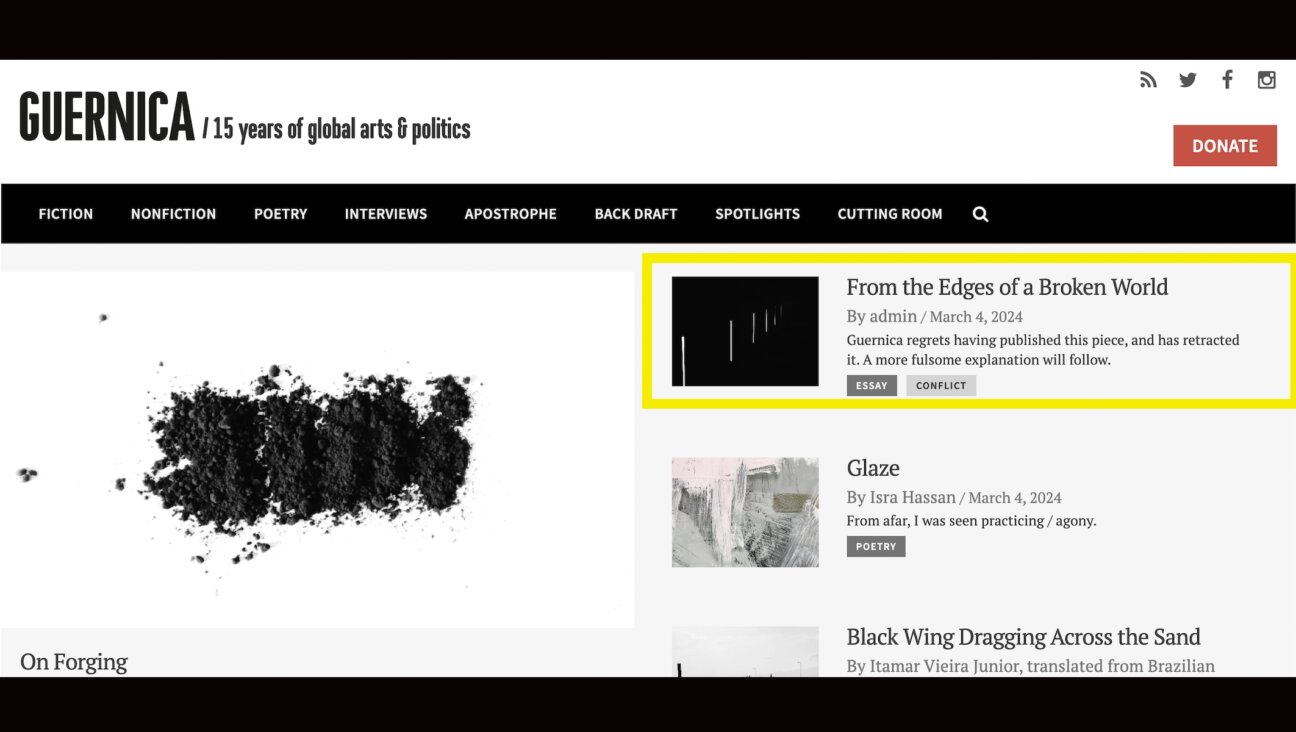Croatian Convert Speaks on Settlers’ Behalf
There were plenty of opportunities for Maayan Yadaiy to give up life in the Gazan settlement bloc of Gush Katif.
The day after she moved to there, Yadiay, 27, was greeted by the frantic knocking of neighbors announcing Prime Minister Sharon’s plan to pull Israeli forces out of Gaza and relocate all of the Jewish settlers there. She also could have moved shortly thereafter, when her husband was called into the Israeli army reserves, leaving her pregnant and alone. And surely, Yadaiy could have left several months after that, when terrorists attacked her car on the road outside Gush Katif — five bullets narrowly missed her husband’s head, the body of her sleeping baby daughter and her own pregnant belly.
But even under fire, as she stared down her attackers and cried “Sh’ma Yisrael!” in fear, Yadaiy did not leave.
A willingness to endure such hardships is hardly news among the estimated 8,000 Jewish settlers living in Gaza. But, as a Croatian-born convert to Judaism, Yadaiy’s unwavering refusal to leave Gush Katif stands out. Which is why the National Council of Young Israel, a leading American voice against Sharon’s disengagement plan, brought her to New York last month to speak on behalf of settlers at the organization’s annual dinner.
“We need to keep each millimeter of our land and not let our killers celebrate their victories in our homes,” she told the audience at the May 22 event.
The next day, Yadaiy told the Forward, “We are fighting against terror! To give them land is to show them we are weak.”
Yadaiy said she refuses to entertain the possibility of disengagement, even as Israeli soldiers are being trained to evacuate children before their parents. “No one will take my children out of my hands,” Yadaiy said. “If someone will come to take me out of my house, I am not responsible for my behavior.”
To some, Yadaiy’s is the face of an extremist, her modest dress and blond hair often accented with orange scarves in solidarity with settlers who oppose disengagement. But she makes no apologies as she calls the forced removal of Israeli settlers “immoral.”
Rabbi Pesach Lerner, executive vice president of Young Israel, praised Yadaiy’s passion and said she was well received by the crowd at the organization’s recent dinner.
Yadaiy was born in 1978 into what she describes as an affluent, Catholic family. She knew no hardship until age 10, when her father died; then, when she was 12, Serbia and Croatia entered into a bloody war that kept Yadaiy, her younger sister and their mother hostage in a Serbian-controlled war zone for the next five years. Overnight, Serbian best friends became enemies, and the small family was thrust into an impoverished life where cold and hunger were as regular as gunfire in nearby streets.
“In one day, I realized I’m Croatian and I’m Catholic,” Yadaiy recalled, saying she survived by praying for salvation — though she did not know what prayer was at the time. Ultimately, she escaped to a Croatian orphanage, then worked on a cruise ship where she met her future husband, Eyal, an Israeli security officer.
Yadaiy remembers the day Eyal told her that he couldn’t marry her because she wasn’t Jewish. “I didn’t feel bad,” she said. “I found it special because he had something stronger than love.” All along she felt that she had been spared in Croatia, Yadaiy said. Judaism offered God as a savior, and she embraced it.
By this time 20 years old, Yadaiy decided to convert, and moved to the ultra-Orthodox neighborhood of B’nei Brak. She learned Hebrew, and became so religious that she insisted Eyal become a “Torah Jew” himself before marrying her.
As newlyweds, the couple traveled over the next two years throughout Israel and to York, Pa., for Eyal’s veterinary apprenticeship. (He now owns a business that performs bovine “pedicures,” a hoof-trimming procedure for cows.) In 2004, when Yadaiy was pregnant with their first child, the agricultural life and close-knit community of Gush Katif drew them to Gaza.
Immediately, they were bombarded with questions.
“Did you move here to be compensated for leaving?” neighbors asked.
“Of course not; I rent this apartment,” Yadaiy replied.
“But there are grenades!”
“I’m from Croatia, I can handle it.”
“You know Arabs are 600 feet away?”
“But they’re close everywhere in Israel!”
Media came calling, too. “They wanted to see me scared,” Yadaiy mused. “But I felt so great.”

I hope you appreciated this article. Before you go, I’d like to ask you to please support the Forward’s award-winning journalism this Passover.
In this age of misinformation, our work is needed like never before. We report on the news that matters most to American Jews, driven by truth, not ideology.
At a time when newsrooms are closing or cutting back, the Forward has removed its paywall. That means for the first time in our 126-year history, Forward journalism is free to everyone, everywhere. With an ongoing war, rising antisemitism, and a flood of disinformation that may affect the upcoming election, we believe that free and open access to Jewish journalism is imperative.
Readers like you make it all possible. Right now, we’re in the middle of our Passover Pledge Drive and we need 500 people to step up and make a gift to sustain our trustworthy, independent journalism.
Make a gift of any size and become a Forward member today. You’ll support our mission to tell the American Jewish story fully and fairly.
— Rachel Fishman Feddersen, Publisher and CEO
Join our mission to tell the Jewish story fully and fairly.
Our Goal: 500 gifts during our Passover Pledge Drive!























